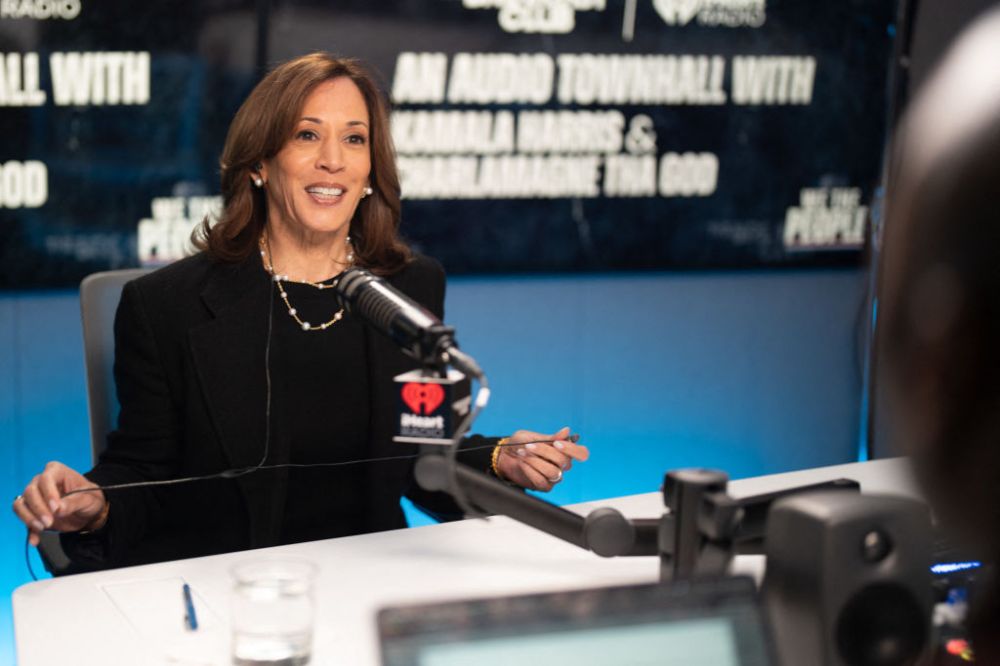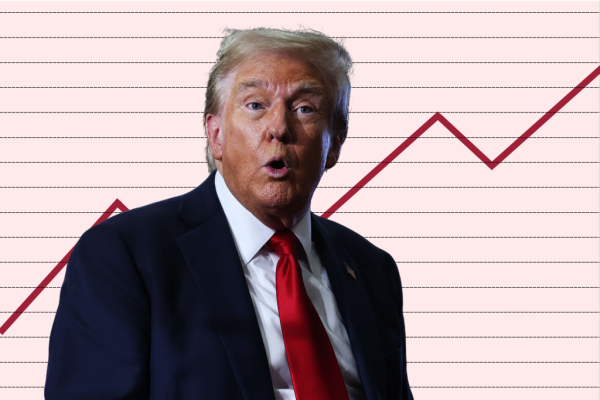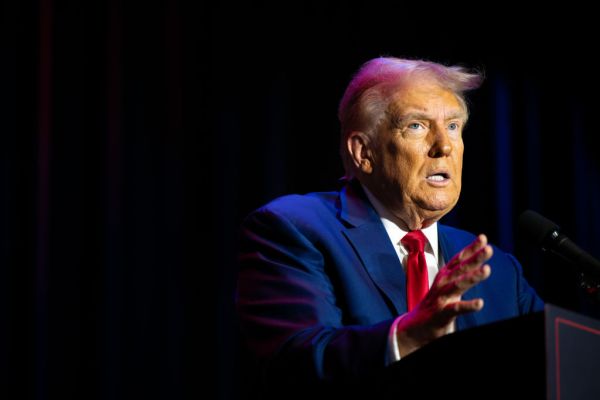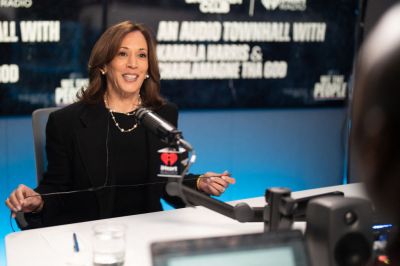Buried somewhere in the bottomless archives of this newsletter is a theory that Donald Trump was polling competitively this year only because most Americans hadn’t begun paying attention yet.
They hadn’t begun paying attention to him, specifically. The sort of casual voter who doesn’t follow politics day to day might not have thought of Trump more than a handful of times since January 6, 2021, so they missed all the talk about “retribution” and “vermin” and “enemies from within” and suspending the Constitution.
Eventually that would change. Democrats would catch them up. And if Democrats didn’t, Trump would catch them up.
He’s too much of a mess psychologically to run a disciplined campaign focused on inflation and immigration. Inevitably he would show his fascistic tendencies on the trail. And once he did, those casual voters who had at last begun to tune in would see the ugly truth and recoil.
That was my theory. It was also Kamala Harris’ theory, I think.
She sold herself as a generic Democrat with few clearly discernible policy positions because she assumed that being Not Trump is enough to win. By remaining inoffensive (and undefined) to casual voters, she made it easy for them to let their revulsion at him guide them into her camp. All she had to do was not be 81 years old and senile, let her opponent gross out everyone with his deepening authoritarian mania, then collect her majority on Election Day.
She executed that strategy to a T. And Trump, bless his heart, has more than fulfilled the role designated for him in her plan.
It isn’t working.
Within the last 48 hours, word came that Harris has agreed to an interview with Bret Baier of Fox News and might be trying to arrange one with Joe Rogan. In both cases, the hosts and their audiences will receive her with sentiments ranging from skepticism to hostility. That’s the sort of risk she assumed she wouldn’t need to take in late October, believing that casual voters would be breaking hard toward her as they realized their only alternative was a caudillo. She’s taking it because they aren’t.
She was wrong, as was I. The slumbering electorate has awakened and Trump is, at worst, a 50-50 proposition to win.
What conclusions about voters should we draw from our error?
The benefit of the doubt.
“Trump has never been well, but he has never been this unwell,” Peter Wehner wrote on Tuesday at The Atlantic. That’s the remarkable thing about his campaign: It’s now late enough in the race that casual voters are at last watching him and thinking hard about their options—and Trump has never sounded crazier. He’s not even making a pretense of cleaning up his act as the spotlight intensifies.
A choice bit from his interview with Fox Business this weekend:
By the “enemy from within,” he didn’t (just) mean illegal immigrants. He named California Rep. Adam Schiff, a Senate candidate, as an example. Trump’s a nationalist through and through, drenched in shallow patriotism yet consumed with treating other Americans as archvillains.
His chatter about immigrants, always inflammatory, has gotten more so. They’re “animals” and “stone cold killers” who’ll “cut your throat,” he’s warned attendees at his rally. Last week he complained about “bad genes” crossing the border. A few days later he vowed to “liberate Colorado” from migrant gangs. If you’re personally inclined to distinguish between violent criminals in the immigrant population and immigrants generally, let me gently suggest that a man running on a program of mass deportation is not.
Even his more innocuous moments on the trail underline Wehner’s point about him being unwell. On Monday night his town hall event in Pennsylvania was twice interrupted by members of the crowd needing medical treatment; Trump stopped the program, told the audience “let’s just listen to music,” and stood there on stage in silence for no less than 39 minutes while some of his favorite tracks played. Had Biden done that, right-wing media would overflow today with calls to invoke the 25th Amendment, and why not?
Trump’s not only losing his marbles in the home stretch of the campaign, he’s losing them in a flagrantly fascist direction. But instead of the polling moving toward Harris this month, it’s moved slightly toward Trump.
No one who believes in the decency of America wants to consider the implications of that closely. So what some have done to cope with reality is to retreat back into my theory: Maybe casual voters still haven’t noticed that he’s blossoming into a cartoonish third-world strongman before our eyes. We should do more to bring it to their attention!
Eleventh-hour examples of urgently trying to bring it to their attention abound lately. Trump’s former secretary of defense, Mark Esper, warned CNN viewers yesterday that his boss’ obsession with loyalty threatens to corrupt the military. Other alumni of his administration hit the trail last week and called him anathema to America’s civic traditions. Trump’s handpicked Joint Chiefs chairman, Mark Milley, described him to Bob Woodward as “fascist to the core,” leading Jake Tapper to read the dictionary definition of the term on air at CNN on Monday and invite his audience to compare Trump’s rhetoric to see how closely it matched.
Never Trump conservatives often complain that figures like James Mattis and John Kelly who know firsthand how dangerous Trump is have kept quiet in this race instead of campaigning for Harris. But Esper and Milley are quite a one-two punch in lending military authority to the anti-Trump cause, especially in such stark, emphatic terms, and both Kelly and Mattis have gone on record in the past about how unfit for office Trump is. The information is there for Democrats to use and/or for curious voters to seek out.
Whose fault is it that it hasn’t succeeded in turning Americans against him?
Harris herself has reached a point of such exasperation at running neck-and-neck with this creature that she resorted to playing clips of some of Trump’s greatest demagogic hits at her rally in Pennsylvania on Monday night. (Her campaign released an ad along the same lines.) “Listen to his words,” she pleaded with her audience. “He tells us who he is.” Her assumption was unmistakable, and true to her initial theory of the campaign: If the polls are tight, it must be that voters haven’t realized yet what he’s planning for America. Once they realize it, they’ll be persuaded.
Is that so? Twenty-one days out from Election Day, they’re still in the dark?
Unlikely. The truth, I think, is that we’ve reached the limits of persuasion about Trump’s menace and a lot of us are having trouble accepting it.
After nine years, a coup attempt, a riot at the Capitol, four criminal indictments, and too many authoritarian word-farts to count, Americans have a fair enough sense of who Trump is, I think. To believe otherwise at this late date reeks of cope, not unlike believing that he has a 47 percent ceiling unto eternity because it’s too painful to reckon with the possibility that he’s grown more popular. It’s unbearable that the citizens of the greatest country in the world would knowingly choose to be led by a figure like Trump after January 6 so some of us have convinced ourselves that they’re choosing unknowingly, forever safely in the dark about his intentions somehow despite him babbling profligately about them on television every day.
There must be a point in this nightmare at which Americans finally lose the benefit of the doubt that they don’t understand what they’re voting for by voting for him. Some, like me, have reached that point. “My faith in democracy is breaking. Part of me is breaking with it,” Wehner quotes Jonathan Rauch in his Atlantic piece about the real prospect of a Trump victory. Writing of his own despair at the outcome, he professes “disbelief” that Americans would opt for a post-insurrection Trump to represent “the soul of the country” over a garden-variety Democrat.
That disillusionment will hit Harris’ supporters like an asteroid next month if he wins. No one is prepared, I think, for how profound the impact will be.
Excuses, excuses.
I complained about all of this to a friend a few days ago and was annoyed by her response. “You need to talk to some real-world Trump voters,” she scolded me, as if I don’t do that regularly with family. “Their reasons for supporting him aren’t the reasons you hear on Twitter or Fox News.”
Fair enough. Certainly, not all Trump voters are postliberals and proto-fascists. Although, just as certainly, some are.
What annoyed me was the whiff of excuse-making in what she said, as it’s a sign of things to come.
If Trump wins, we’re going to spend four years chest-deep in rationalizations for why his supporters voted as they did. Seeing him reelected will be traumatic, but seeing his voters excused for it will be infuriating. The least consolation as Trump goes about doing what he’ll do will be holding them properly morally accountable for having made the choice they made. They knew the risks; they were warned again and again; they concluded that those risks were acceptable.
They had every reason to take him seriously and literally given how his first term ended. Whatever happens now, they own him completely.
And why shouldn’t they? The most one can say for “normie” Trump voters at this point is that they’re indifferent to demagoguery. Perhaps they’re indifferent because they’re in denial about it, or perhaps they’re indifferent because they share his animosity toward the “enemy within.” Either way, they don’t care. And if their plan is to start caring after he’s president, if and when he follows through on authoritarian schemes, they may discover that a term-limited strongman with an absolute floor of 43 percent in job approval stopped caring about their opinions the second their votes were counted.
The most charitable explanation for Trump voters’ civic indifference is that some can’t afford to care, literally. Inflation has eaten up the paychecks of the working class; they’re voting for economic change, not for persecuting the “enemy from within.” But even that excuse goes only so far: Between using tariffs as a cure-all and inflicting mass deportation on the labor force and national supply chains, Trump’s program is obviously more inflationary than Harris’. A voter willing to condone civic disaster because he cares only about rising prices will be rewarded with both.
To say that most Trump supporters are voting for him in spite of his most sinister ideas rather than because of them is to say nothing in their defense, then. Loathsome political movements have always thrived on the indifference of citizens who care only that the trains run on time and who avert their eyes from the rest.
And needless to say, how Trump interprets his victory is likely to differ from how his most bottom-line voters do. If he spends the final month of the campaign seething about pet-eating migrant savages and the “enemy from within” and wins anyway, it’ll be hard to convince him that he lacks popular support to indulge his worst impulses. Jonah Goldberg is right that presidential “mandates” are a stupid concept, but stupidity has never deterred Trump from believing what he wants to believe.
There’s another excuse we’ll all soon have to cope with if he prevails next month. It’s not that Americans directly and indirectly condone his civic excesses, we’ll be told, it’s that Kamala Harris was just that bad as a candidate that they couldn’t help but choose him over her. This one will be especially popular among anti-anti-Trump conservatives, whose core conviction is that there’s never good reason to prefer a Democrat even if the Republican on the ballot is a moral, civic, and intellectual degenerate.
It’s nonsense, though. Harris may not be a good candidate but she easily clears the bar of Mussolini-but-dumber.
You shouldn’t need me to recite her faults at this point. She endorsed a hard-left agenda in 2019 to try to win a primary and now has cynically reversed herself on practically all of it. She frequently descends into word salads when she tries to sound statesmanlike in interviews, leading voters to question if she’s as smart as her résumé suggests. And she’s saddled with the record of an unpopular incumbent who was headed for certain defeat before he imploded at a national debate. If you had the chance to draft a nominee after Biden dropped out, you wouldn’t draft her.
But … who would you draft? Which Democrat, supposedly, would have proven so popular and manifestly qualified for the job that millions of Americans who now find themselves indifferent to Trump’s cretinism would have scurried over to the other side to support him or her?
Gavin Newsom? He’s a living, breathing symbol of California’s decline under toxic hyper-progressivism. Josh Shapiro? He has less than two years’ experience as governor and it’s anyone’s guess how his Jewish faith would have played with the far left.
Gretchen Whitmer? I don’t know that she’d win African American voters at the same clip that Harris is likely to win them. But even if we concede that Whitmer would have been the stronger nominee, how much stronger do we think she would have been realistically?
Maybe a point better in national polls? That’s not nothing, but we’d still end up with an election on a knife’s edge and your friendly neighborhood Dispatch columnist wondering why Trump’s descent into overt fascism hadn’t created a landslide in polling. Why, if only Democrats had chosen Kamala Harris, with her high name recognition and nearly four years of experience in the West Wing, maybe voters wouldn’t be so jittery about rolling the dice on Trump’s untested opponent.
Had Joe Biden foolishly remained in the race, there would have been a legitimate excuse for a Trump victory: Americans lost faith that the old man had four more years in him and opted for a gargoyle who’s likely to at least finish his second term. But that excuse evaporated in July—and since replacing him, Harris has objectively overperformed expectations. She’s been good at rallies, gave a solid convention speech, trounced Trump at the debate, raised a head-spinning amount of money, built an impressive ground game, tacked to the center to reassure nervous moderates, and executed the cynical but clever strategy I described earlier of transforming herself into a generic Democrat who can appeal to voters seeking a “change candidate.”
The closest she’s come to a meaningful mistake was choosing Tim Walz over Shapiro as her running mate, but Walz hasn’t done her any detectable harm. Given the heavy political forces weighing on her, one can plausibly argue that she should be losing decisively right now and would be if she hadn’t run such a good campaign.
Harris isn’t the problem. The problem, to quote Kevin Williamson, is that “‘We the People’ are, in their formal democratic aspect, cretins.”
All I ask, then, as we prepare to collectively stare into the abyss is this: Let’s not make excuses for Americans next month if they light what’s left of their civic birthright on fire. The economic news lately has been good. Harris has been no worse than a mediocre candidate. And voters very much have been apprised of Trump’s bad intentions, as he simply will not stop confirming them in interviews and at rallies.
If the country elects a fascist, it’s because a critical mass of the electorate either prefers fascism or is indifferent enough to it at this point to have treated their votes as a “business decision,” in the odious words of Georgia Gov. Brian Kemp. No excuses.







Please note that we at The Dispatch hold ourselves, our work, and our commenters to a higher standard than other places on the internet. We welcome comments that foster genuine debate or discussion—including comments critical of us or our work—but responses that include ad hominem attacks on fellow Dispatch members or are intended to stoke fear and anger may be moderated.
With your membership, you only have the ability to comment on The Morning Dispatch articles. Consider upgrading to join the conversation everywhere.